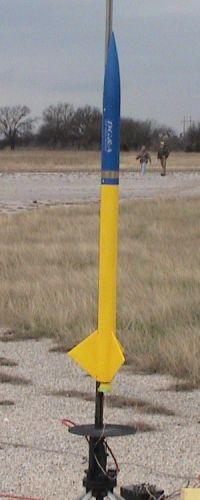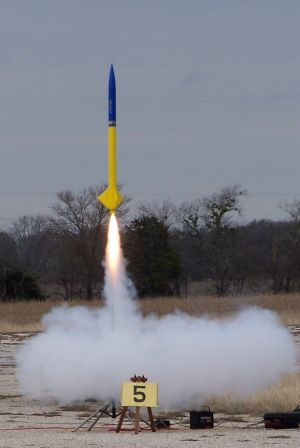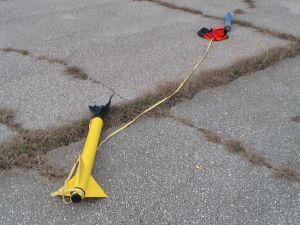Scratch Polistes/Vespa Original Design / Scratch Built
Scratch - Polistes/Vespa {Scratch}
Contributed by Greg Deeter
| Manufacturer: | Scratch |

Brief:
This is a single staged LMR (large model rocket) and HPR allowing it to be
flown at fields with a G motor limit as well as on high power motors such
as H and above. This rocket was built in two evenings for an upcoming event
and was designed to replace my DG&A Wasp which was nearly destroyed the
previous weekend due to the CATO of a Cesaroni H153 on its 19th flight. It
is currently 4" taller than a stock DG&A WASP, and once the nose cone
arrives which it is designed to use, it will be 8" taller than stock. As
far as it's name, this rocket is called the Polistes/Vespa which is
intended to refer to the fact that it is a member of the Wasp
family--specifically the paper wasp--and Vespa in Italian is a slang word
for a "fast motor scooter". A more common usage of the word which actually
means wasp. It is also very similar to the Spanish pronunciation of wasp,
"avispa", which you will hear commonly in Texas.
Construction:
I started out with a design that could not be finished before this build due to
the fact that the nose cone had not arrived yet. I had ordered a 3" x
18.75" 6:1 conical fiberglass cone from Performance Rocketry to give it a
real spike image varying from the original Wasp design drastically. As it had
not come in yet I used a normal 3" R.W.W. nose cone that we have all seen.
They all look the same. The payload bay as well as the fins were from DG&A
Rocketry. The LOC airframe and the centering rings were ordered from
Quickburst.net. Motor retention is a new 38mm threaded "bell" cone
from Giant Leap. Recovery system consists of stainless steel U-Bolts and
quicklinks from Lowes Hardware, 20' tubular Kevlar®
recovery harness from Giant Leap, Nomex®
recovery harness protector and shield from Quickburst.net, and TAC-1 parachute
from C.L.E. Enterprises.
The build was fairly simple and was just the same as a DG&A Wasp. I first removed the glassine layer from a 38mm motor tube by using a sharp X-Acto knife to get the layer removal started with the spiral seam. I then cut the fin slots with the same knife and then sanded the fins to an airfoil with a belt sander. The fins came out better than on any previous rocket I have ever built and it was my first time to use a belt sander. I picked up a Craftsman from Sears for about $80 just for this project the night before starting the build. I used 28 minute epoxy to seat the fins to the motor tube and there are no internal nor external fillets of any type.
Finishing:
The rocket was finished with Kilz white primer on the main airframe, covered by
Rust-Oleum John Deere Yellow, while the payload bay and temporary stock nose
cone was only coated with royal blue Rust-Oleum Paint for Plastic. That type of
paint claims that no primer is needed but in my experience you do need primer.
Final details were the application of some decals, an attractive gold foil
stripe from DG&A High Power Rocketry and a DG&A silver logo on the
payload bay.

Flight:
This rocket was launched on it's maiden voyage on 2/12/05 at the Hearne Texas
Municipal Airport during the annual Hearts & Darts event with Houston's
NHRC, a NAR contest / HPR sport
launch. A complete video of the
launch is available too. [Warning: file size is 55.7MB!]
The motor I selected was one of my favorites, the fairly new LOKI Research H144. I set the delay at 10. As you can see by the excellent photo thanks to NHRC President Warren Benson, the LOKI Research H144 produced a brilliant white flame and puffy white smoke which is a trademark of the "LOKI White" propellant. These motors were just certified by Tripoli in October 2004 and they are becoming very popular. They were the most commonly used H motors at this event in fact.
A high point of this launch for me was that Danny Cantu of DG&A Rocketry was a vendor at the launch and I got to meet and visit with him for the first time, as well as show him the Vespa, have him watch it fly, and share stories of my DG&A Rockets like the Sonik-Blast, WASP, Mini-Sonik Blast, etc. I also got to look at his entire line of rockets, even some prototypes, I even bought an L3 L-3 Armageddon kit and have the T-Shirt to prove it.
Winds were fairly high at the time of launch, yet I had some blue sky and decided to go for it. The rocket moved so fast that it whistled when slowing down for apogee. I always love when they do that. The 10 second delay could have been an 8 for perfect apogee. Hit at least 2000+ feet fast.

Recovery:
Rocket landed
on the airport runway or tarmac with a "tarmac" kiss on the top of
one fin. And something quite odd happened, the recovery harness / shock cord
tied a perfect knot around the slimline bell cone retainer. See photo.
The rocket is fine, I am still waiting for the cool looking needle like nose cone I ordered for it originally and should it arrive soon I should have another photo of it as it is designed to be.
Summary:
I am very pleased with this rocket. It's the first time I have scratch built a
high powered rocket, yet the design is so close to the DG&A WASP I have to
thank DG&A for this rocket. I consider it to be a DG&A even though only
the fins and nose cone were from DG&A this time. The WASP was one of my all
time favorite rockets, as well as my most frequently flown HPR. I plan on
flying the Vespa very often and expect it will have a long life as a reliable
HPR bird.
Other:
I highly suggest the HPR rocket this was inspired from, the DG&A WASP,
available here : http://www.dgarockets.com
It's an excellent, low priced way to build a very strong and attractive rocket that you can even use to L1 certify with. Very stable and reliable rocket. It's very fast and looks great as well. :)
Sponsored Ads
 |
 |











